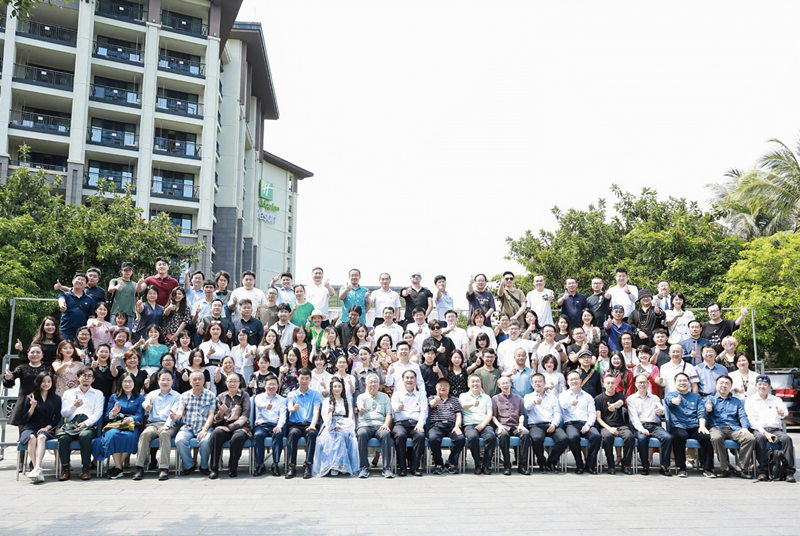'The Stars' novel wins China's top sci-fi award
- By Zhang Rui
 0 Comment(s)
0 Comment(s) Print
Print E-mail China.org.cn, April 28, 2021
E-mail China.org.cn, April 28, 2021
Chinese writer Zhao Lei has scooped the top award for his novel "The Stars" at the 11th Chinese Nebula Awards in Lingshui, Hainan province.

"The Stars," published by People's Literature Publishing House and sci-fi brand Eight Light Minutes in 2019, won the gold award for best sci-fi novel. The seven-member jury praised the work in a statement that read: "The novel manages to tell a hardcore science fiction story in the style of a thriller, with the writer skillfully using a dual-plotline structure. The writer's imagination is bold and uncanny, yet logically rigorous. The author is like a clever detective, uncovering the secrets of space signals through the vivid characters one by one, until the final shocking truth is revealed."
The novel is the latest work by Zhao, who writes under the pen name Qi Yue (July). He started writing back in 2001, but took a decadelong hiatus from the world of literature as he pursued a career in the video game industry. After deciding to write again, the result was "The Stars."
In addition, the gold award for best sci-fi novella went to Baoshu's "Celestial Priest," while Chen Qiufan picked up the top award for best sci-fi short story for "In this Moment, We Are Happy." Chen Yang, whose translation of "Central Station" by Israeli British author Lavie Tidhar, won the gold award for best translated novel. "Cognitive Defamiliarization: A Study into the Science Fiction of H.G. Wells" by Li Chan won the gold award for best nonfiction book.
The Chinese Nebula Awards, an international award for science fiction writers in the Chinese language, are organized by Xinhuanet, Eternal Vision Science Fiction & Media Co. (Hainan) and Time Vision, with guidance from China International Culture Exchange Center. It was founded by Chinese sci-fi heavyweights Dong Renwei, Yao Haijun and Wu Yan in 2010. The event is held annually, with the exception of last year when the ceremony was canceled due to the COVID-19 pandemic. As such, the 11th edition was eventually held this year on Saturday, however foreign guests were absent from the ceremony as the pandemic situation remains serious in many countries.
More than 300 sci-fi writers, publishers, experts and professionals from the culture and tourism sector, industries of film, finance and real estate as well as workers and readers from Chinese sci-fi circles, attended the event in Lingshui Li Autonomous County in south China's island province of Hainan, which is gearing up to build the Hainan Free Trade Port.

Past winners include such top Chinese writers as Liu Cixin, Wang Jinkang, Han Song, He Xi and new generation front-runners such as Chen Qiufan and Jiang Bo. This year, Gu Congyun, aka "Mu Ming," won the gold award for best new sci-fi writer, while several writers including Wang Nuonuo, Wu Chu, Zhao Lei, Fenxing Chengzi took home silver awards. "They are the future stars of Chinese sci-fi," the renowned writer and award juror Han Song said.
Gillian Zhao, the president of Warner Bros. China, also attended the event in search of new works of literature with potential for investment. "This year I feel that the award-winning works are updated and iterated, and a lot of new talent has emerged," she told China.org.cn," and the subjects have become more diversified."
Han noted that Chinese sci-fi has become a favorite among the public, growing from a niche and marginal literature in China thanks to the efforts of sci-fi enthusiasts across the country. The genre has also been bolstered by Liu Cixin's win at the Hugo Awards for "The Three-Body Problem" and the box office triumph of sci-fi movie "The Wandering Earth."
Dong Renwei, sci-fi mogul and one of the founders of the awards, has bigger ambitions for the development of sci-fi in China. He hopes that the Chinese Nebula Awards can become a top sci-fi award globally and that the country can become the next sci-fi center in the world.
"In building up Chinese cultural soft power, science fiction is an important part. China should develop new styles of science fiction with elements of Eastern culture, and show the world its local values," he said. "That's the most important mission of those working in Chinese sci-fi today."






Go to Forum >>0 Comment(s)